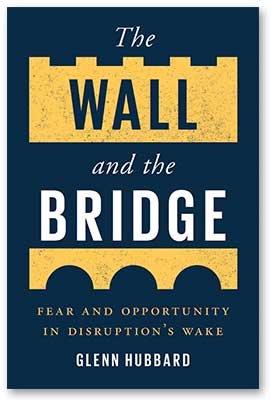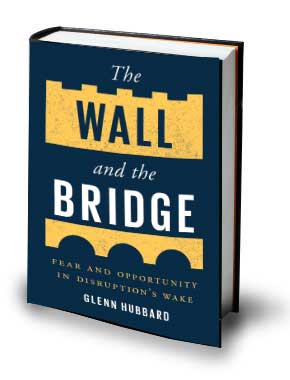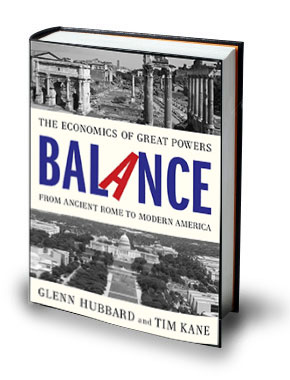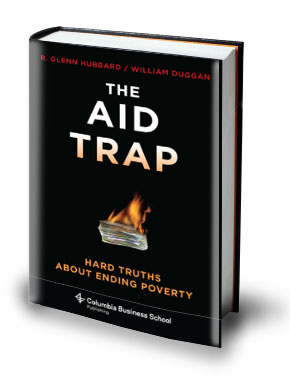 Glenn Hubbard served as President George W. Bush's top economic
adviser before joining Columbia University's Graduate School of Business
in 2004 as dean. Hubbard recently sat down with Fortune's Nin-Hai Tseng for a wide-ranging discussion
including the debate about the debt ceiling, his brief (and albeit
ambushed) moment in the popular documentary Inside Job, as well as the culture of corporate America and business schools following the financial crisis. Here's an edited transcript.
Glenn Hubbard served as President George W. Bush's top economic
adviser before joining Columbia University's Graduate School of Business
in 2004 as dean. Hubbard recently sat down with Fortune's Nin-Hai Tseng for a wide-ranging discussion
including the debate about the debt ceiling, his brief (and albeit
ambushed) moment in the popular documentary Inside Job, as well as the culture of corporate America and business schools following the financial crisis. Here's an edited transcript.
You helped design the tax cuts enacted in the early 2000s. Those cuts were hotly debated and ultimately extended last year. Given the country's debt problems today and as Congress debates raising the debt ceiling, where do you think tax policy should go from here?
If you're talking about the debt today and the debt path in the future, it's principally a spending problem. There doesn't exist a feasible tax increase to solve that. That's not a political comment.
You'd have to raise every tax in the country to 70% to close that gap. And keep in mind taxes on the rich, despite the fact they're the President's hobby horse, you could double the tax burden on the top 1% and you wouldn't even deal with one-quarter of this year's deficit. The math just isn't there.
That doesn't mean that taxes can't or shouldn't be part of the solution. I'm mystified by both sides' emphasis on the Bush tax cuts as if those are religious articles to either attack at one side or defend on the other. What we need is tax reform and part of that was in the Bush tax cuts.
I think lower marginal tax rates are a good idea and I don't think we should raise them. But if we want to have more revenue out of our tax system we could in the near term go after tax expenditures --- deductions and things like that. And I would hope in the longer term have a tax reform that moves much more toward consumption taxation and not income taxation.
Where President Obama is both disingenuous and feckless even is suggesting that raising marginal rates somehow would have much to do with deficit deduction. The math just doesn't work.
So where in the budget should the government cut?
Over the long-term the entire budget problem facing the country is more or less an entitlements problem and it boils down to two parts. One is easy and the other is hard. The one that's easy is social security because we could fix social security by slowing the rate of benefit growth for upper middle income and upper income households. We could do that quickly, and middle and lower income households wouldn't even feel the pain.
I don't mean that's politically easy, but economically that's not hard.
Harder is Medicare and Medicaid. Most of the Medicaid problem is also a problem of the elderly. People think of Medicaid as the program for the poor and it is. But the biggest spending growth in Medicaid is not about poor people, it's about nursing homes for the elderly. And so really most of the entitlement problem is an old age healthcare problem, whether you call it Medicare or Medicaid. And unfortunately we took such a disastrously wrong turn in health care reform with passage of the Patient Protection and Affordable Care Act. I don't think we can fix Medicare until we fix the PPACA.
We really need to trim back subsidies for more affluent people. There's really no reason to have Medicare subsidies for well-to-do people. We can't afford that in this country. We ought to focus the subsidies on people who really need them and make them more generous for those people.
Let's talk about the U.S. financial crisis. Charles Ferguson's popular documentary, Inside Job, takes a look at the financial industry and the culture that led to the 2008 financial meltdown. You were featured in the film in sort of a deer-in-headlights moment when the director asks you about which financial firms you consult for. What are your thoughts of the film and your appearance in it?
Well it's a very interesting thesis. I think it's completely silly. I actually wrote a book about the financial crisis as I tried to explain to the director. You don't see that in any of the movie. His thesis seems to be that what caused the financial crisis was a group of people -- whether they're academics or business people or government officials -- moving in and out of Washington.
I can only wish I had that kind of power. I don't think I do -- I'm just a teacher. So that part is absolutely silly. I think it's muck-racking -- it makes average people angry, but there's nothing to it. He's entitled to his views. What he's not entitled to do is lie – and he did it repeatedly through the movie about me and about other people.
He said that I didn't disclose my activities. The only reason he could only even ask me about my activities is because they're on my web site.
The financial crisis proved there was a breakdown in leadership and ethics. Where should corporate America go from here?
I actually think pure fraud and ethics issues were important in the crisis but not central. I know the press thinks they're central. I think economics was central and we tend to pay attention to Bernie Madoff and other fraudsters, which are frankly in every boom period. We always have fraudsters. I think the bigger issue is how do you get people to focus on the long-term value of their business. If they do that, that obviously requires ethical leadership and management. And it requires putting your client first.
There are two ways to think about putting the customer first. One is a matter of ethics. But I actually think it's a matter of good business. If you put your client and customer first you're going to have a better long-term franchise than somebody who doesn't. If you look at the financial institutions who have done relatively well they tended to be ones who put their customers first as opposed to selling their customers things they should not have.
As dean of one of the world's top business schools, how do you think the financial crisis has changed Columbia's business school?
We've tried to think more deeply about lessons from it in two ways. One is how you see opportunities in a crisis. Some colleagues and I have been teaching a seminar called the Future of Finance, which takes a look at how we should think of the investment bank of tomorrow, the mortgage contract of tomorrow, the credit card business of tomorrow given what happened. How do you make money in this kind of turmoil?
The second thing is how do you arrest crisis before it happens. So the financial crisis, at least in my view as an economist, was not a lightning bolt. It was more like a slow moving train wreck, meaning there was plenty of opportunity to stop it. So how do you teach business people to connect dots that were right in front of their face?
One way we've tried to look into that is through some new integrated cases that are included in the first year in the MBA curriculum. You see the same case from different perspectives so you get a sense of what data you could have looked at.
This year's MBA class looked at General Motors (GM), which was a clear slow-moving train wreck. We asked what could you have looked at, what questions could you have asked had you been the boss, and when was GM effectively bankrupt?
Traditional case studies are more about connecting the pieces of soft information. But in the case of GM what was needed was connecting pieces of hard information. There was lots of data. The question is how could you as the boss know how to collect it.
There were too many CEOs, particularly in financial institutions that were experts at certain things, but in terms of putting together pieces of the puzzle in front of their face they didn't do a very good job.







